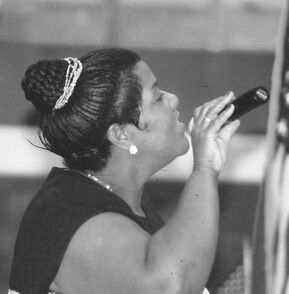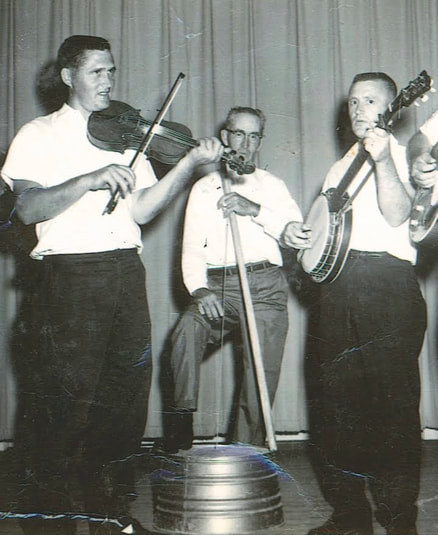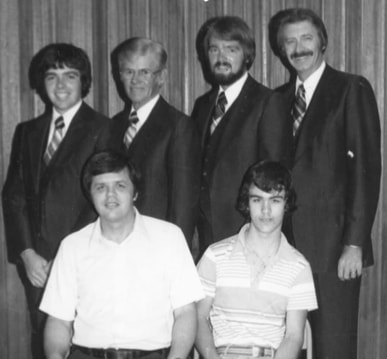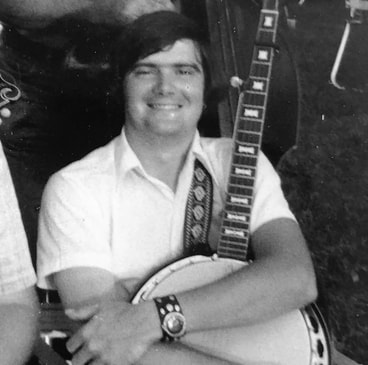Bessie Jarrett
Beloved and Influential Gospel Artist

As read by LaShell Moore, Arts in McNairy Board Member
June 7, 2019
Bessie Jarrett is one of this region’s most beloved gospel singers and a mainstay of McNairy County music. With her partner and good friend, Danny Churchwell, Bessie formed the dynamic duo, Bessie and Danny, and odds are, everyone in this room heard them perform at one time or another at a local wedding, community event, fundraiser or concert. For nearly two decades, Bessie and Danny seemed to be dazzling audiences somewhere, nearly every week. Yes, Danny Churchwell was Bessie’s musical partner, but he was also one of her biggest fans, and their collaboration was the first exposure many people had to the tremendous talent of Bessie Jarrett. So, it was only fitting that Bessie was invited to perform the musical tribute for Danny on the occasion of his induction to the McNairy County Music Hall of Fame in 2015. Many attendees at that ceremony observed that Bessie and Danny could easily have been inducted as a duo, or that Bessie would be a good Hall of Fame candidate as a solo gospel artist. It was true then, and it’s true now, so here we are. Congratulations to you, Bessie, and thank you for your patience.
But Bessie Jarrett is way more than your typical wedding singer or a compliment to Danny Churchwell’s piano styles. She is a gifted and influential artist in her own right and her roots in McNairy County music are both deep and exceedingly rich. Bessie found her musical voice at Mt. Olive Church in Guys, Tennessee at the tender age of 8 and she never looked back. “To Canaan’s Land I’m on my way,” Bessie sang out loud and proud. “Dear friends, there’ll be no sad farewells; there’ll be tear-dimmed eyes. Where all is peace, and joy, and love; where the soul never dies!”
Mrs. Norma Jean Dillworth who accompanied Bessie on piano that day must have been shocked that an 8 year old girl, singing for the first time in public, could improvise her own arrangement, command the attention of the congregation, and draw them all into worship with such ease. But that is rather precisely what happened, and it wouldn’t be the last time. She was back the next week with another song, and then another, and then another…Bessie had found her calling and even as a child, she knew it. God meant for her to sing, so sing she did.
Bessie became a regular in her church choir, was often featured as a soloist, and called on for various special programs and events in the region. For almost ten years she sang in a popular gospel group traveling to churches and communities around the area spreading the praise and joy of the Lord. At only 23, she wound up in Memphis at Designer Records—a black gospel label which had successful releases on numerous respected gospel groups including The Shaw Family, The Jubilee Hummingbirds, The Memphis Harmonizers and the Gospel Songbirds. Bessie recorded a 45 RPM single of Jordan River with Troubles of this World on the B-side. Designer, founder, and creative director Style Wooten offered her a recording contract, but Bessie declined preferring the simple life of Guys, Tennessee to the limelight of the Memphis and Mid-South gospel scene.
Bessie’s first love was, and will always be gospel music, but she soon found she had a certain restlessness and a desire to scratch her creative itch in new ways. The challenge of mastering other genres of music appealed to her sense of adventure, so Bessie began to audition for regional musical theatre productions. The first major success came in the role of Mother Superior for The Sound of Music. She brought down the house singing the signature song, Climb Every Mountain, from one of Rogers and Hammerstein’s most popular Broadway musicals. And she made a nun’s habit look good, too. Bessie was invited to appear on numerous radio and television programs where she held her own performing alongside well known celebrities and recording artists. For many years she was a favorite performer on regional fundraising telethons and appeared on the popular Kay Bain Show in Tupelo, Mississippi. (Kay, of course, is a McNairy County native and a 2015 Hall of Fame inductee.) Bessie also won wide recognition in numerous artists showcases including, most notably, finalist and first place winner in Talent America in 1992 and 1996. She earned enough hardware on the talent show circuit to open her own trophy shop—and that’s no joke. She has also done some modeling and vocal coaching in her time which led to an invitation to be a judge for the Miss Tennessee Pageant in 2002. Bessie has even been a guest soloist with the Corinth Symphony, where she performed a stirring rendition of the Battle Hymn of the Republic backed by the full orchestra. Trust us, when we say that she has pipes to pull that off as easily as a walk in the park.
Bessie Jarrett is comfortable with styles of music ranging from classical to jazz, blues, country, broadway, pop standards and everything in between. But it is gospel where she found her voice and it is gospel that sustains her even now. Many people with her talent would have gone in another direction, seeking fame and fortune in popular music, and truthfully, Bessie thought seriously about taking that path for a while. But reflecting on more than fifty years of singing gospel music, Bessie now says it all worked out the way it was supposed to for her. She sees purpose and meaning in the trajectory of her singing career. It might have been personally gratifying to be in the national spotlight—an affirmation of her powerhouse vocal abilities—but she rightly observes that fame is fleeting and for many artists’, their success is their undoing. But the contentment Bessie feels comes from a different place. She has the joy of knowing that her voice was used for a higher purpose than simple entertainment. She has spent a lifetime ministering to the hearts of her neighbors through her God-given gift of song, and McNairy County, and our entire region, is the richer for it. It is a fine thing to have the momentary satisfaction of a top 40 hit, but Bessie’s music resonates in eternity, and that will sustain her long after the spotlight fades.
Bessie’s journey in music has been both deeply personal and deeply spiritual. In her artist’s statement, she says it this way: “Singing has always been my refuge. It has always soothed and comforted me in every situation in life. When words weren’t sufficient, when even the presence of loved ones failed to console, music ministered to my inner soul. It’s more than an enjoyable pastime for me. Music is a passion, a calling, and a direct line of communication to God.”
The truth of that is evident to anyone who has had the pleasure of hearing Bessie Jarrett sing. If you haven’t been so fortunate, you are in for a treat tonight. The passion and spirituality so eloquently described in her artist statement comes through loud and clear in every note and phrase, touching the audience’s soul just as surely as it touches Bessie’s. She is a true McNairy County original, but her transcendent vocals have won Bessie accolades well beyond our borders and made her one of the most revered gospel voices of her generation. But if you ask her how she can manage to be all of that in one package, she is more than content to give the glory to God. And we have to believe that is the true secret to her success.
It is my distinct honor to induct Ms. Bessie Jarrett into the McNairy County Music Hall of Fame in the Class of 2019.
June 7, 2019
Bessie Jarrett is one of this region’s most beloved gospel singers and a mainstay of McNairy County music. With her partner and good friend, Danny Churchwell, Bessie formed the dynamic duo, Bessie and Danny, and odds are, everyone in this room heard them perform at one time or another at a local wedding, community event, fundraiser or concert. For nearly two decades, Bessie and Danny seemed to be dazzling audiences somewhere, nearly every week. Yes, Danny Churchwell was Bessie’s musical partner, but he was also one of her biggest fans, and their collaboration was the first exposure many people had to the tremendous talent of Bessie Jarrett. So, it was only fitting that Bessie was invited to perform the musical tribute for Danny on the occasion of his induction to the McNairy County Music Hall of Fame in 2015. Many attendees at that ceremony observed that Bessie and Danny could easily have been inducted as a duo, or that Bessie would be a good Hall of Fame candidate as a solo gospel artist. It was true then, and it’s true now, so here we are. Congratulations to you, Bessie, and thank you for your patience.
But Bessie Jarrett is way more than your typical wedding singer or a compliment to Danny Churchwell’s piano styles. She is a gifted and influential artist in her own right and her roots in McNairy County music are both deep and exceedingly rich. Bessie found her musical voice at Mt. Olive Church in Guys, Tennessee at the tender age of 8 and she never looked back. “To Canaan’s Land I’m on my way,” Bessie sang out loud and proud. “Dear friends, there’ll be no sad farewells; there’ll be tear-dimmed eyes. Where all is peace, and joy, and love; where the soul never dies!”
Mrs. Norma Jean Dillworth who accompanied Bessie on piano that day must have been shocked that an 8 year old girl, singing for the first time in public, could improvise her own arrangement, command the attention of the congregation, and draw them all into worship with such ease. But that is rather precisely what happened, and it wouldn’t be the last time. She was back the next week with another song, and then another, and then another…Bessie had found her calling and even as a child, she knew it. God meant for her to sing, so sing she did.
Bessie became a regular in her church choir, was often featured as a soloist, and called on for various special programs and events in the region. For almost ten years she sang in a popular gospel group traveling to churches and communities around the area spreading the praise and joy of the Lord. At only 23, she wound up in Memphis at Designer Records—a black gospel label which had successful releases on numerous respected gospel groups including The Shaw Family, The Jubilee Hummingbirds, The Memphis Harmonizers and the Gospel Songbirds. Bessie recorded a 45 RPM single of Jordan River with Troubles of this World on the B-side. Designer, founder, and creative director Style Wooten offered her a recording contract, but Bessie declined preferring the simple life of Guys, Tennessee to the limelight of the Memphis and Mid-South gospel scene.
Bessie’s first love was, and will always be gospel music, but she soon found she had a certain restlessness and a desire to scratch her creative itch in new ways. The challenge of mastering other genres of music appealed to her sense of adventure, so Bessie began to audition for regional musical theatre productions. The first major success came in the role of Mother Superior for The Sound of Music. She brought down the house singing the signature song, Climb Every Mountain, from one of Rogers and Hammerstein’s most popular Broadway musicals. And she made a nun’s habit look good, too. Bessie was invited to appear on numerous radio and television programs where she held her own performing alongside well known celebrities and recording artists. For many years she was a favorite performer on regional fundraising telethons and appeared on the popular Kay Bain Show in Tupelo, Mississippi. (Kay, of course, is a McNairy County native and a 2015 Hall of Fame inductee.) Bessie also won wide recognition in numerous artists showcases including, most notably, finalist and first place winner in Talent America in 1992 and 1996. She earned enough hardware on the talent show circuit to open her own trophy shop—and that’s no joke. She has also done some modeling and vocal coaching in her time which led to an invitation to be a judge for the Miss Tennessee Pageant in 2002. Bessie has even been a guest soloist with the Corinth Symphony, where she performed a stirring rendition of the Battle Hymn of the Republic backed by the full orchestra. Trust us, when we say that she has pipes to pull that off as easily as a walk in the park.
Bessie Jarrett is comfortable with styles of music ranging from classical to jazz, blues, country, broadway, pop standards and everything in between. But it is gospel where she found her voice and it is gospel that sustains her even now. Many people with her talent would have gone in another direction, seeking fame and fortune in popular music, and truthfully, Bessie thought seriously about taking that path for a while. But reflecting on more than fifty years of singing gospel music, Bessie now says it all worked out the way it was supposed to for her. She sees purpose and meaning in the trajectory of her singing career. It might have been personally gratifying to be in the national spotlight—an affirmation of her powerhouse vocal abilities—but she rightly observes that fame is fleeting and for many artists’, their success is their undoing. But the contentment Bessie feels comes from a different place. She has the joy of knowing that her voice was used for a higher purpose than simple entertainment. She has spent a lifetime ministering to the hearts of her neighbors through her God-given gift of song, and McNairy County, and our entire region, is the richer for it. It is a fine thing to have the momentary satisfaction of a top 40 hit, but Bessie’s music resonates in eternity, and that will sustain her long after the spotlight fades.
Bessie’s journey in music has been both deeply personal and deeply spiritual. In her artist’s statement, she says it this way: “Singing has always been my refuge. It has always soothed and comforted me in every situation in life. When words weren’t sufficient, when even the presence of loved ones failed to console, music ministered to my inner soul. It’s more than an enjoyable pastime for me. Music is a passion, a calling, and a direct line of communication to God.”
The truth of that is evident to anyone who has had the pleasure of hearing Bessie Jarrett sing. If you haven’t been so fortunate, you are in for a treat tonight. The passion and spirituality so eloquently described in her artist statement comes through loud and clear in every note and phrase, touching the audience’s soul just as surely as it touches Bessie’s. She is a true McNairy County original, but her transcendent vocals have won Bessie accolades well beyond our borders and made her one of the most revered gospel voices of her generation. But if you ask her how she can manage to be all of that in one package, she is more than content to give the glory to God. And we have to believe that is the true secret to her success.
It is my distinct honor to induct Ms. Bessie Jarrett into the McNairy County Music Hall of Fame in the Class of 2019.


